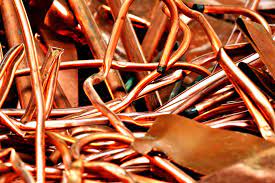www.montanwerke-brixlegg.com – Sustainable copper for tomorrow’s economy
 Copper, a ubiquitous metal known for its reddish-orange hue, possesses a remarkable quality that often goes unnoticed – its ability to turn green. When exposed to various environmental factors over time, copper undergoes a chemical reaction known as oxidation, resulting in the formation of a greenish patina on its surface. This distinctive transformation has captivated the attention of artists, architects, and scientists throughout history, leading to the emergence of what we commonly refer to as „green copper.“ The green coloration of copper is primarily attributed to the formation of copper carbonate and copper hydroxide compounds on its surface.
Copper, a ubiquitous metal known for its reddish-orange hue, possesses a remarkable quality that often goes unnoticed – its ability to turn green. When exposed to various environmental factors over time, copper undergoes a chemical reaction known as oxidation, resulting in the formation of a greenish patina on its surface. This distinctive transformation has captivated the attention of artists, architects, and scientists throughout history, leading to the emergence of what we commonly refer to as „green copper.“ The green coloration of copper is primarily attributed to the formation of copper carbonate and copper hydroxide compounds on its surface.
These compounds, collectively known as verdigris, arise from the reaction between copper, moisture, and carbon dioxide in the air. The process is gradual, taking years or even decades to manifest fully, but the result is an exquisite patina that adds an element of natural beauty to copper objects. One of the most iconic examples of green copper is the Statue of Liberty in New York Harbor. The statue, originally made of copper, underwent the oxidation process over time, resulting in its distinctive green color. The patina not only protects the underlying copper from further corrosion but also imparts a sense of grandeur and timelessness to this symbol of freedom and democracy. Apart from its aesthetic appeal, green copper offers practical advantages as well.
The patina acts as a natural protective layer, shielding the underlying metal from further corrosion. This inherent resistance to decay has made green copper a popular choice for architectural elements such as roofs, domes, and gutters. The durable and weather-resistant nature of green copper ensures longevity, making it a sustainable and cost-effective choice for various applications. Green copper’s versatility extends beyond its use in architecture. Artists and craftsmen have long admired the unique visual effects created by combining copper’s reddish-orange base with the evolving green patina. This combination of colors lends itself to a wide range of creative expressions, from sculptures and jewelry to home decor and functional objects.
The interplay between the warm, earthy tones of copper and the vibrant, verdant hues of the patina adds depth, character, and a touch of nature to artistic endeavors. Furthermore, green copper has gained recognition for its eco-friendliness. As a fully recyclable metal, copper can be reused indefinitely without any loss in quality or performance. Recycling copper not only conserves valuable natural resources but also significantly reduces energy consumption and environmental impact compared to the production of new copper. This sustainable aspect has further enhanced the desirability of green copper in an era where environmental consciousness is paramount.
In conclusion, green copper stands as a testament to the captivating beauty of natural processes. Its transformation from a warm, reddish-orange metal to a stunning green patina symbolizes the passage of time, the forces of nature, and the enduring appeal of artistic expression. Whether adorning architectural marvels, inspiring creative works, or contributing to sustainable practices, green copper continues to fascinate and inspire individuals from all walks of life. All further information about green copper (sustainable copper) you can find here.
Montanwerke Brixlegg AG – Kupferkathoden & Kupferbolzen
Andreas Enderle
Werkstraße 1
6230 Brixlegg
Österreich
E-Mail: office@montanwerke-brixlegg.com
Homepage: https://goo.gl/maps/ybSDP3pHRFKyd7XP8
Telefon: +43 5337 6151
Pressekontakt
Montanwerke Brixlegg AG – Kupferkathoden & Kupferbolzen
Andreas Enderle
Werkstraße 1
6230 Brixlegg
Österreich
E-Mail: office@montanwerke-brixlegg.com
Homepage: https://goo.gl/maps/ybSDP3pHRFKyd7XP8
Telefon: +43 5337 6151
Comments are closed.